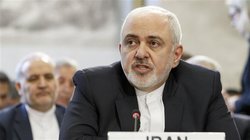 Foreign Minister Mohammad Javad Zarif reiterated that Iran is proudly needless of foreign supports for its independence, highlighting that his country is relying on its own domestic capabilities.
Foreign Minister Mohammad Javad Zarif reiterated that Iran is proudly needless of foreign supports for its independence, highlighting that his country is relying on its own domestic capabilities. RNA - “Our greatest honor is that no one can tell us ‘if I don’t support you for a week, you will be speaking Arabic, Russian, or English,’” Zarif said on Thursday in Iran’s Northeastern city of Mashhad, highlighting that this independence is not a minor achievement at all.
He referred to the remarks made by US Sen. Lindsey Graham in an interview with Fox News in early December that without US pressure against Iran, "they'd be speaking Farsi in about a week in Saudi Arabia".
The Iranian diplomatic chief added that Iran relies on its domestic capabilities for ensuring security and promoting industrial development.
He went on to say that the notion of being a superpower is weakening and no country can claim that it can decide the fate of the whole world.
Today’s world is not of the kind that one country could decide for a group of other states, Zarif said adding that power has been distributed among different countries and it is not exclusive anymore.
Earlier on December 14, Zarif had touched upon Graham’s remarks and said, "I am ashamed of hearing these remarks, as a Muslim and a person living in this region, but I am also proud we have lived in such a way for over 40 years that no one could dare to say the same thing about us."
He added that Iran with the lowest defense spending in the Middle East is the strongest country of the region, while the US with the highest military budget in the world is unable to stop Iran’s growth which shows that the US’ power and influence is waning.
The Iranian diplomatic chief stressed that Iran is a powerful and influential country, in terms of geography and history, and this is a fact that has been proven not only over the past forty years after the victory of Islamic Revolution, but also since the past 7000 years ago.
"Iran's defense budget in the whole region is the lowest, with the exception of Egypt. Saudi Arabia spent over $69 billion last year on weapons purchases. The total budget of the Islamic Republic of Iran in defense field is less than $ 16 billion. So what has made us so powerful? Our nation are the backbone of our national security and we are nothing without our people," he added
Why are our people so important? If it was fifty years ago, could we talk like this about the role of our nation? No, because the components and tools of power have changed, and that we could act without the intervention of the foreigners and aliens represents our strength; our power is endogenous, Iranian foreign minister noted.
It does not matter to our enemies who is the president or the minister in the Islamic Republic. They do not recognize the existence of the Islamic Republic of Iran, he noted.
The era of all-powerfulness is over, and this is in our favor; Mr. Trump once said that the US military spending equals that of entire world. The United States now has allocated $650 billion for its defense sector, however, President Trump, with all this power, sends representatives to various countries forcing them to stop doing business with Iran, which indicates the decline of US influence and power.
In a related front in early November, Top Military Aide to the Iranian Supreme Leader Major General Yahya Rahim Safavi asserted that the US' power is fading away and Washington is unable to win control over Iranians’ economy and fate.
"According to documents found in the US embassy in Tehran, from the 1953 Coup to the overthrow of Mohammad Reza Pahlavi in 1979 all the affairs of Iran were in hand of the United States," he highlighted.
"In the past 40 years, the US has staged all-out effort to fight Iran but they have conceded a defeat and are forced to retreat from the western Asian region," Safavi added.
According to Fars News Agancy, he went on to say that with the formation of the Resistance Axis and the guidance of Islamic Revolution Leader and late Imam Khomeini, nations take control of their own fate.
After the fall of both the last Iranian king and the establishment of monarchy in Iran in 1979, the US government tried different scenarios including a direct military attack, coup, indirect military attack via supporting former Iraqi dictator Saddam, funding anti-Iran terrorist groups, and giving home to anti-Iran terrorists.
847/940